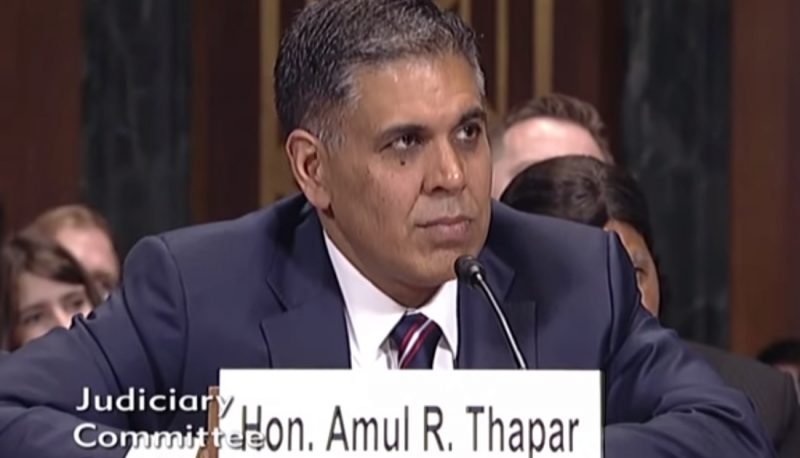“Confirmed Judges, Confirmed Fears” is a blog series documenting the harmful impact of President Trump’s judges on Americans’ rights and liberties. Cases in the series can be found by issue and by judge at this link.
Trump Sixth Circuit Judge Amul Thapar argued in dissent that federal class actions should be extremely limited, so that effectively only people within one state can form a class, even if a corporation’s misconduct harms people in many states. The panel majority rejected Thapar’s claim in its March 2021 ruling was Lyngaas v. Curaden AG.
Brian Lyngaas is a dentist in Michigan who received unsolicited advertisements for toothbrushes manufactured by Curaden AG from its American distributor Curaden USA These ads were sent out to over 46,000 different fax numbers in multiple states. On behalf of similarly situated dental professionals, Lyngaas filed suit in district court in Michigan, contending that the faxes constituted a violation of the Telephone Communications Protections Act (TCPA). The district court certified the case as a class action and ruled in favor of Lyngaas and awarded damages, although it held that only the company that improperly sent the ads, not its parent corporation, could be liable for violating the TCPA. Both parties appealed.
A Sixth Circuit panel affirmed the ruling of the district court in a 2-1 decision. The majority explained that the district court had correctly interpreted the law and applied the facts, including with respect to the TCPA and the “claims-administration process” it set up to deal with relief for the individual class members around the country. Based on the facts and the law, the majority went on, the situation in the case, where “unsolicited fax advertisements” were improperly sent to “a target list of fax numbers,” is “precisely the type best handled” through such a process.
Trump judge Thapar dissented in favor of Curaden on two issues. He argued that Curaden did not violate the TCPA at all with respect to people who received the fax via computer because the law supposedly “does not make it illegal to send unauthorized fax ads to computers,” which he claimed were different for these purposes than “telephone facsimile machine[s]” as stated in the statute. The majority squarely rejected that claim, noting that the statutory language “clearly covers more than a traditional fax machine” and includes “equipment” like computers that have the “capacity” to “transcribe text and messages,” as the FCC determined in 2015.
In an even more troubling argument, Thapar claimed that the lawsuit, as well as many others, could not be brought as a class action at all with respect to people who did not live in Michigan, because a court in Michigan could not get “personal jurisdiction” over Curaden as to “each unnamed class member.” He based this largely on the Supreme Court decision in the Bristol-Myers Squibb case, where the Supreme Court ruled that a state court must be able to get personal jurisdiction over a defendant as to each person who sues in a “mass-tort action.”
The majority strongly rejected this claim, which it noted would create a “major change” in the law and significantly limit the ability to bring federal class actions where a corporation has harmed people in multiple states. The Squibb case, the majority continued, involved “[h]undreds of individual plaintiffs,” from inside and outside California, who filed suits in California state court contending that they were injured by a blood-thinning drug. The “separate complaints” were consolidated into a “coordinated mass action” under California state law. But the Supreme Court ruled that the case had to be dismissed, because the out-of-state plaintiffs “had no connection” to California and there was no “adequate link between the State and the nonresidents’ claims,” so that the state court had no jurisdiction or authority over Squibb concerning nonresidents’ claims.
The majority in this case noted that the Squibb Court took careful pains to “limit its decision,” and ruled that it simply did not apply to federal class actions. The majority explained that a state court “mass-tort action” is a consolidated case that combines multiple lawsuits by a number of individual injured people, each of whom must be able to sue the corporation that committed the “mass tort” in the state court, including having “personal jurisdiction” over the corporation. In contrast, the majority went on, a federal class action is “formally one suit” in which the corporation “litigates only against the class representative,” who represents all class members as to whether the corporation is liable, and absent class members are not considered “parties” for purposes of determining whether the court has jurisdiction over and authority to sue the corporation. As long as the court has jurisdiction over the corporation concerning the class representative, the case can properly proceed.
The majority thus explained that “[l]ong-standing precedent,” including in the Supreme Court, “shows that courts have routinely exercised personal jurisdiction” over corporations in “nationwide class actions” like this case. Accordingly, the majority went on, the courts have “rejected” the effort to extend Squibb to make “many nationwide class actions constitutionally invalid” for lack of personal jurisdiction over the corporation as to “unnamed class members,” and this court agreed. Thapar’s dissent, the majority concluded, was improperly trying to read a “new and unsupported holding” into Squibb and other decisions.
Trump judge Thapar’s views would have produced dire consequences if he had been in the majority. His opinion would have created a much higher, more difficult legal standard for individuals attempting to participate in a multistate federal class action, at least in the Sixth Circuit, trying to hold corporations accountable for misconduct. Fortunately, the majority rejected Thapar’s assertions, and the Lyngaas claim for TCPA violations by Curaden across the country can go forward.
Note: the initial draft of this blog entry was prepared by PFAW legal intern Oliver Telsuma.

